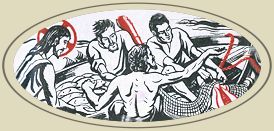» Enjoy our Liturgical Seasons series of e-books!
Jesus said to his apostles: "Whoever loves father or mother more than me is not worthy of me, and whoever loves son or daughter more than me is not worthy of me, and whoever does not take up his cross and follow after me is not worthy of me. Whoever finds his life will lose it, and whoever loses his life for my sake will find it" (Matt 10:37-39).
Today is the feast of St. Irenaeus which is superseded by the Sunday Liturgy.
Click here for commentary on the readings in the Extraordinary Form of the Roman Rite.
Sunday Readings
The first reading is taken from the second Book of Kings 4:8-11, 14-16a. The account of Elisha and the woman was a minor incident in the life of this prophet, who worked greater miracles, but it is narrated to show that God rewards those who are charitable to his friends. — The Sunday Readings
The second reading is from the Letter of St. Paul to the Romans 6:3-4, 8-11. St. Paul stresses that we are buried with Christ in baptism. We die with him to sin. Then we rise with him to a new life.
The Gospel is from St. Matthew 10:37-42. In the first part, Christ tells his representatives, his delegates the Apostles, and those who succeed them, that they must be prepared to undergo great sacrifices, even death itself, if called on to do so for the sake of Christ. Even though they had only a very vague idea then of what he meant, when the time came, they remembered his words and gladly suffered imprisonment, hardships, and finally martyrdom for Christ. This shows how the resurrection of Christ, and the descent of the Holy Spirit on them, changed them from worldly weaklings into fearless heroes. They had become convinced that Christ was the Son of God who had come on earth to bring all men to heaven. They came to realize how transitory, and unimportant, the few years of the earthly life were when compared with the eternal life of bliss to follow.
It was not only the Apostles who gave their lives gladly for Christ. There are thousands of martyrs who, during the first three centuries of the Church, not only accepted but welcomed death for Christ's sake, because they were convinced that it was the door to eternal life, the only life that mattered. Nor did occasions for martyrdom cease when the Church was granted freedom by Constantine, the first convert Roman emperor. Here and there, down through the centuries, the followers of Christ have been persecuted because of their belief in him, and many of us can be proud that we have had among our ancestors men and women who died for the faith.
Today, too, there are still those who are suffering a lingering martyrdom, worse than quick death on the scaffold, because they obey God rather than man. We can help them to persevere, by our prayers. We ourselves, who are free from any overt persecution, must show our gratitude to God for being allowed to practice our religion openly and without fear, by doing just this. We must live according to the convictions of our Christian faith. We are here in this world for a few short years, our real and lasting home is in heaven. We must keep this thought uppermost in our minds, in all our doings and dealings.
As well as carrying out our own personal duties, we must remember the spiritual needs of our fellowmen. They, too, need to go to heaven and anything less will be eternal disaster for them. We may not be able to preach, or teach them the truth of the Christian faith, but we can and must help all those who are doing so.
Remember our Lord's words today. He who receives or gives hospitality and help to a prophet will have the reward of a prophet. He who helps those who are preaching and teaching the message of salvation, the good news of Christ, at home and abroad, will himself share in the reward of these preachers and teachers. When we get to heaven, one of the many pleasant surprises awaiting us will be the gratitude we will receive from saints we've helped to send to heaven, people we never knew or perhaps thought about. We helped those who thought about them and worked for their salvation, and we thus have a share in their reward.
Remember Christ's promise: even a cup of cold water will not go unrewarded, every little helping hand we give to bring our fellowmen to heaven will help us, too, toward the same goal. Heaven is our real goal in life—it alone will satisfy all our desires and it alone will last forever.
Excerpted from The Sunday Readings by Fr. Kevin O'Sullivan, O.F.M.
Commentary for the Readings in the Extraordinary Form:
Fourth Sunday after Pentecost
 "Put out into the deep . . . lower your nets for a catch . . . Henceforth thou shalt catch men" (Gospel)
"Put out into the deep . . . lower your nets for a catch . . . Henceforth thou shalt catch men" (Gospel)
Simon Peter received the "call to action." How did he respond? "At Thy word I will lower the net." What was his reward? "All . . . were amazed at the catch." The call to Catholic Action has been repeated by the Popes in our day. "They (have) beckoned to their comrades . . . to come and help them" (Gospel).
More than ever in this age of global war, "all creation groans . . . in pain," waiting for "redemption" from life-killing sin; waiting for its "adoption" into Divine Life "as sons" of God (Epi9stle). For their sake we must act as members of a Church Militant, not of a Church "pacifist" or sleeping. "Enlighten my eyes, that I never sleep in death" (Offertory).
Do not be afraid to answer this call for Catholic Action; "put out into the deep!" "Lower your nets!" even though "armies in camp should stand together against" you (Introit).
Excerpted from My Sunday Missal, Confraternity of the Precious Blood






